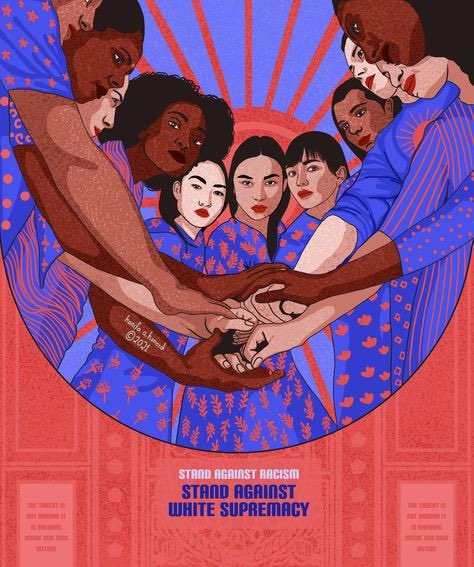Cover art by Alexandra Levasseur
I recently read Sister Outsider by Audre Lorde (1934-1992), a preeminent voice in feminist, LGBTQ+, and civil rights literature and poetry. Self-describing as a “Black, lesbian, mother, warrior, poet,” Lorde has devoted her life to tackling the obstacles we face in navigating intersectional identities, and how this affects both our sense of self and our relationships with others. In Sister Outsider, Lorde’s compiled essays and speeches delve into the contradiction of community versus alienation, and how these things coexist — “sister” for this sense of togetherness we find in identity and solidarity, and “outsider” for the inevitable isolation that comes with this consciousness. I feel her elucidations on a good deal of these subjects can be applied to so many issues we tackle as Asians, and as women.
An important theme Lorde discusses in her essays on feminism and racism is the disharmony found within marginalized groups. She describes a fear of having to “share” or “give away” one’s freedoms as another gains equality, using the term horizontal hostility to describe divisions between Black men and women, between heterosexual and queer women, and between white women and women of color. Horizontal, because these groups that experience discordance are ones under the same means of oppression. Although not explicitly defined, “vertical” oppression comes from above — and results from systems like racial capitalism and European colonialism. Horizontal hostility diverts our fervor from these larger systems and instead weaponizes our identities to fuel disunity.
While white women were fighting for voting rights and economic independence from Seneca Falls in 1848 to the first attempt for a woman’s suffrage amendment in 1874, Asian women were still fighting to even be let into the United States.
The Page Act of 1875 prohibited the entry of any Chinese women, considering them “undesirable.” Historian Sucheng Chan described the reasons Americans provided to sustain their hostility towards Chinese women — “they allegedly brought in especially virulent strains of venereal diseases, introduced opium addiction, and enticed White boys into a life of sin.” In addition, the Chinese Exclusion Act of 1882 banned all Chinese from immigrating.
According to Dr. Minoo Moallem, white feminism has attempted to cater and enlighten asian women through “feminist imperialism,” in which so-called third-world women “get constructed as a singular, non-Western other.” White feminism mimics the same tactics that western civilization has used throughout the centuries of colonization. Instead of the potential for cultural and ideological exchange, it becomes a matter of power and hence, subjugation.
Our stories as Asian women are not told within the political narrative of the mainstream women’s movement because white women do not experience injustice because of their race. When Asian women are assaulted, harassed, and raped by men, white women will never fully understand how this is a product of not just our sexual and gender identities, but our race and culture, as well.
Asian American scholar Gary Okihiro states, “Europe’s feminization of Asia, its taking possession, working over, and penetration of Asia, was preceded and paralleled by Asian men’s subjugation of Asian women.” The products of colonization and westernization are seen in popular culture’s emasculation of Asian men, causing their desire to falsify this stereotype. This has created a rift in the solidarity between Asian men and women for liberation — another example of horizontal hostility that Lorde describes between members of the same marginalized group. Asian mens’ apprehension towards being categorized within these feminine stereotypes can lead them to physically abuse and harass Asian women to prove their masculinity.
Facing violence from members outside of our own racial groups as well as within, Asian women face physical, verbal, and sexual abuse because of both the depictions of their gender intertwined with their racial identity — to white men, the fetishization of Asian women, and to Asian men, their own feminization. White feminism continues to uphold this when it fails to address the racial significance of these problems under the umbrella of women’s rights.
In Sharin N. Elkholy’s essay on Feminism and Race, she describes, “Women of color in the U.S., for example, not only define themselves in a struggle against white men and men of color, but also in resistance to white women.”
“As women, we have been taught either to ignore our differences, or to view them as causes for separation and suspicion rather than as forces for change.” This is what Lorde states in her essay, “The Master’s Tools Will Never Dismantle the Master’s House.” Sustaining our current systems of racism and capitalism, which are both deeply enshrined in our legislation, will never allow us to truly achieve equality as women. Currently, white feminism views people of color as an extra issue to tackle, separate from their own cause. When we refuse to see the intersectionality between being female, being working class, and a person of color, we stray even further from progress.
Lorde states that racial and sexual identities should not be a reason for division, but a prompt to listen and understand one another.“We have been socialized to respect fear more than our own needs for language and definition, and while we wait in silence for that final luxury of fearlessness, the weight of that silence will choke us. The fact that we are here and I speak these words is an attempt to break that silence and bridge some of those differences between us, for it is not difference which immobilizes us, but silence. And there are so many silences to be broken.”
Sources
Sister Outsider by Audre Lorde (1984)
https://iep.utm.edu/fem-race/#H5
https://open.spotify.com/episode/649Hi0VOrlED8T0iryaoJi?si=IDZfxde2TwmYUlbTS35X8g&dl_branch=1
http://www.asian-nation.org/gender.shtml#sthash.22b6PBPp.dpbs
https://www.api-gbv.org/about-gbv/statistics-violence-against-api-women/
Edited by Mahitha Mamilla


